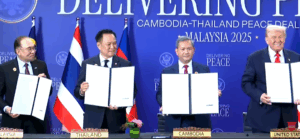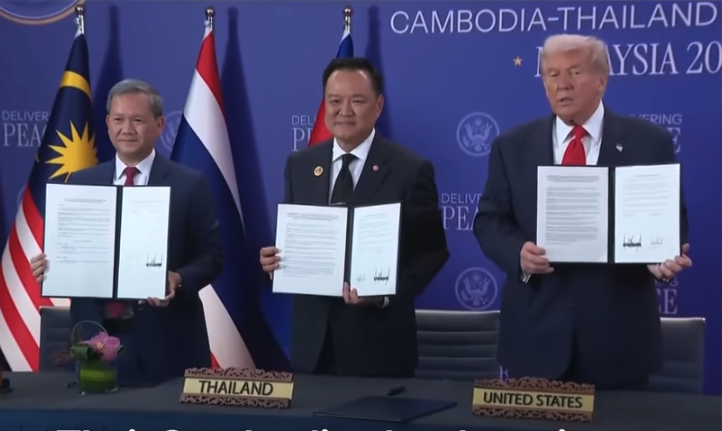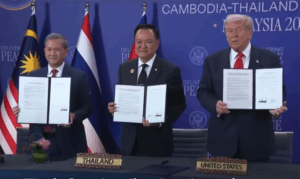KUALA LUMPUR — President Donald Trump presided over the signing of a long-delayed peace accord between Thailand and Cambodia in Kuala Lumpur on Sunday, hailing it as “a monumental step for Southeast Asia.” The agreement, formally named the Kuala Lumpur Peace Accord, calls for troop withdrawals, landmine clearance, and the creation of a joint observer team to monitor the disputed frontier.
Trump, who reportedly pushed for the signing ceremony as a condition for attending the annual ASEAN summit, delivered a characteristically expansive speech highlighting his personal role in the mediation process. “This is much more important than a round of golf,” he said, recalling that the idea first came to him while visiting his Turnberry resort in Scotland. “Saving people and saving countries — that’s real fun.”
Limited but Symbolic Progress
Under the terms of the deal, both countries will remove heavy weaponry from the contested Dangrek Mountains region and replace missing border markers with temporary ones. The agreement also establishes a joint task force to tackle cross-border criminal networks and scam centers — a rising concern for both governments.
While officials from Bangkok and Phnom Penh described the accord as a “positive step forward,” analysts note that most of its provisions merely reaffirm a ceasefire reached in July. Regional experts and domestic commentators have warned that, without a permanent demarcation of the border, tensions could easily reignite.
Reactions Across the Region
In Thailand, local media offered cautious praise, emphasizing that the accord could stabilize rural border provinces long affected by landmine contamination. Cambodian outlets, meanwhile, framed the event as a diplomatic success that elevated the nation’s regional standing.
Internationally, reactions were mixed. China’s Foreign Ministry issued a brief statement welcoming “the easing of tensions between two important ASEAN partners,” while U.S. allies in the region expressed measured support. The European Union called the agreement “an encouraging gesture toward peaceful resolution,” but several analysts questioned Washington’s long-term commitment to Southeast Asian diplomacy.

Trump’s Bid for Peacemaker Legacy
Trump’s participation was viewed by many as part of his broader effort to recast himself as a global mediator ahead of the 2026 U.S. election season. “He clearly wants the optics of statesmanship,” said Dr. Lila Nguyen, a Southeast Asia specialist at Chulalongkorn University. “But whether this deal holds will depend far less on Washington’s rhetoric and far more on local cooperation along the border.”
Despite the fanfare in Kuala Lumpur, both governments privately acknowledge that the historic territorial disputes remain unresolved — and could, once again, test the limits of the newly signed peace. (zai)


